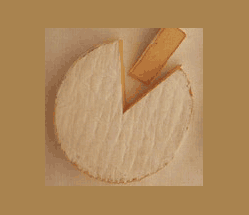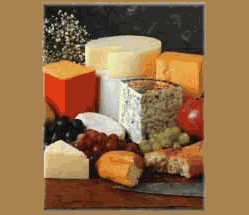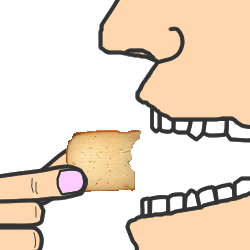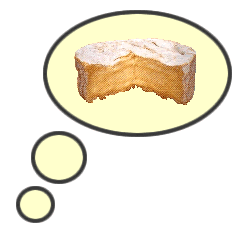
When and how do you use articles?
Use articles...
1) To refer to something whose identity is not clear
Use un, une or des indefinite articles or du or de la (or de l' before a vowel or mute h) partitive articles. (What's the difference between indefinite and partitive articles?)
Phillipe trouve un portefeuille avec des
billets de banque. ![]()
In this story, the wallet ('portefeuille') is a new item, being introduced for the first time. We don't know which wallet it is, we don't know whose it is or where it come from, since it's not been mentioned before. It is anonymous.
2) To refer to something whose identity is clear
Use Le, la and les (and l' before a vowel) definite articles to refer to a specific object that has just been mentioned or whose identity is already clear:
Phillipe prend l'argent et laisse le portefeuille
sur le trottoir. ![]()
Definite articles are used here because they refer back to objects already mentioned in this story. We now know which money Philippe is taking (the money contained in the wallet) and which wallet he leaves behind (the wallet he has just found in the street). The identity of these nouns is now clear because they have just been mentioned.
Sometimes the identity of a noun is clear even if it has not been mentioned before. This is true of 'generic' concepts, concepts that you can expect everyone in a culture to be familiar with.
L'honnêteté n'est pas son
fort (his strength). ![]()
'Honnêteté' is used with a definite article here because its identity is clear. We all know what honesty is (well, except for Philippe), even though it's not been mentioned yet in this little moral tale. (In case you don't make it to the end of this section, it should be pointed out that Philippe suffers horribly and deeply regrets his decision not to track down the rightful owner of the wallet.)
These 'generic' concepts often cause problems because in the same situation English tends to omit articles altogether.
Honesty is not one of Philippe's strong points.
Students of French tend to find it difficult to decide when to use an indefinite or partitive article and when to use a definite article, so there follows a series of comparisons between the two.
Bear in mind that the article you need to use does not depend upon what noun you are using it with but how you are using the noun.
| If you're referring to something real, something that exists at the time of speaking, something tangible, use an indefinite article (un, une, des) or a partitive article (du, de l', de la) | If you're referring to something hypothetical, something general, something as a concept, an idea, a whole group or category of things, use a definite article (le, la, les, l') |
|
('Want some cheese.
''Please!') |
('Do you like crêpes?
''Mmmmmm.') |
You say 'du fromage' here because you are talking about some specific cheese (still in the fridge, perhaps), although some specific cheese which hasn't yet been mentioned, whose identity is not know (will it be brie? will it be roquefort?). In other words you don't know which cheese you are being asked about.
You say 'les crêpes', however, because you are not (necessarily) talking about any specific crêpes that have been made, or any that are ready to eat, but about crêpes as a concept, as a stock culinary item that most people are familiar with. The identity of 'crêpes' as a concept is clear, because you can imagine them, and it is this concept that you are referring to.
The secret here is in the verb.
'Tu veux...' is offering something real, something that exists. In this sentence, it is something whose identity is unclear, has not yet been established ('Tu veux du fromage?' it could also be 'Tu veux des crêpes?'). In another sentence you could use 'Tu veux...?' to refer to something whose identity is clear and established. (You could say, for example, 'Tu veux le fromage?' which implies 'Do you want the cheese that I just mentioned' or 'the cheese which I am pointing to', 'the cheese that's on the table here', etc.)
'Tu aimes...', on the other hand, will always refer to something whose identity is clear. 'Tu aimes le fromage' might refer to real cheese (meaning 'Do you like the cheese... that I've just offered you and which you have just eaten') or it might refer to the idea of cheese (meaning 'Do you like cheese... in general, as a concept').
Notice, finally, the difference in English.
If you are referring to something specific the identity of which is unclear,
| in French you say 'Tu veux du fromage ?' in English you say 'Do you want some cheese?' |
If you are referring to something specific the identity of which is clear,
| in French you say 'Tu aimes le fromage
[que tu viens de manger] ?' |
|
| in English you say 'Do you like the cheese [which you have just eaten]?' |
If you are referring to something general, as a concept,
| in French you say 'Tu aimes le fromage
[en général] ?' |
|
| in English you say 'Do you like cheese [in general]?' |
In all three cases, French uses an article. In one case, English doesn't.
| If you're referring to something real, use an indefinite article (un, une, des) or a partitive article (du, de l', de la) | If you're referring to something as a concept, something imagined, use a definite article (le, la, les, l') |
| There's some cheese on the table. It exists. I know because I can smell it. It's been there for days. It's mushy. That's how cheese should be. Looks like camembert. It's a good example of camembert. It's about to meet my taste buds, slip down into my stomach and make me happy... = du fromage | Cheese rules! I love cheese. I don't have any in my fridge right now, but I love it anyway. Cheese, that's the solid bits that remain when you let milk go bad. Moldy cheese, smelly cheese, sweaty cheese, even cheese curds. I love it all. = le fromage |
| If you're referring to something specific, to one example of a group, use an indefinite article (un, une, des) or a partitive article (du, de l', de la) | If you're referring to something general, to a whole group or category of things, use a definite article (le, la, les, l') |
 |
 |
|
du fromage
|
j'aime le fromage
|
| If you're referring to something that exists at the time of speaking, use an indefinite article (un, une, des) or a partitive article (du, de l', de la) | If you're referring to something as a type, as a category, something generic, use a definite article (le, la, les, l') |
| " Ce crottin de chèvre a l'air très bon, avec une
pâte molle et une odeur de paille. C'est parfait pour ma recette."
|
fromage n.m. 1. Pâte comestible au goût caractéristique faite de lait caillé, fermenté ou non ; masse mise en forme de cette pâte.[two separate sections, one for each language?]cheese /t i z/ n. 1 a a food made from the pressed curds of milk. b a complete cake of this with rind. |
| If you're referring to something that can be appreciated by the senses, use an indefinite article (un, une, des) or a partitive article (du, de l', de la) | If you're referring to something that can be appreciated by the imagination, use a definite article (le, la, les, l') |
 |
|
Certain verbs 'invite' an indefinite article (un, une,
des) or a partitive article (du, de l', de la)
(they tend to refer to nouns as real, specific things):
| Je mange du fromage pour le petit déjeuner. | |
| J'achète du fromage chaque jour. | |
| Tu prends encore du fromage ? |
Certain verbs, expressing likes and dislikes, 'invite'
a definite article (le, la, les, l')
(they tend to refer to general concepts):
| J'aime le fromage à la folie. | |
| J'adore le camembert surtout. | |
| Je déteste le fromage fabriqué en série. |
Translation from Above
"This hunk of goat's cheese seems very good, with a soft inside and a scent of straw. It's perfect for my recipe."
There are times when you should NOT use articles, even though your instincts may tell you otherwise.
Ther are also times when you should use certain articles
to accompany geographical nouns.
 'Le fromage est toujours dans mes rêves.'
'Le fromage est toujours dans mes rêves.'